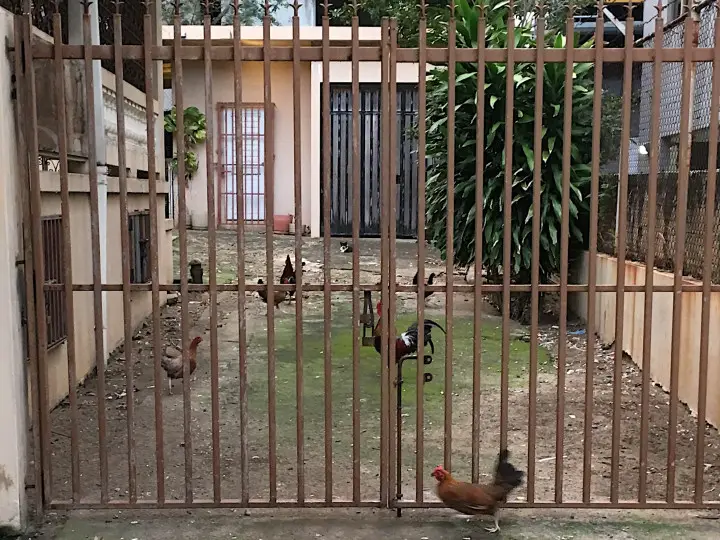Homesteading is an activity that has grown to include urban dwellers in the urban homesteading phenomenon. This concept incorporates growing your own food and, in some cases raising certain livestock, such as chickens. Is it possible to keep urban chickens, and how do you go about it?
Raising urban chickens is possible but has unique challenges due to the local environment, municipal by-laws, and regulations that may restrict the activity. Urban homesteaders can increase their food security and self-sufficiency by including chickens in their strategy, even on a small scale.
As cities become more crowded and people yearn for a connection to nature and sustainability, urban chicken farming has emerged as a surprising yet fulfilling solution. How feasible is it to keep urban chickens? What are the benefits, challenges, and legal implications of keeping urban chickens? We will explore all these aspects of keeping chickens in an urban setting and how you can get started!
Urban Farming: Are Urban Chickens A Possibility For You?
Urban farming, once a fringe movement, has now firmly taken root in cities across the globe. The desire for fresh, locally sourced food, coupled with an increasing awareness of sustainability, has led many urban dwellers to transform their balconies, rooftops, and backyards into miniature farms.
The reasons behind this trend are many. For one, there’s the appeal of self-sufficiency. In an era of global supply chain uncertainties, being able to grow your own food provides a sense of security.
Urban farming also allows city dwellers to reduce their carbon footprint by cutting down on the transportation and packaging involved in supermarket produce.
But it’s not just about fruits and vegetables. The urban farming movement has extended to include small-scale livestock rearing, with chickens being the most popular choice. Chickens are relatively easy to care for, require less space than larger farm animals, and provide a steady supply of fresh eggs.
The Possibility Of Raising Chickens In The City
Raising chickens in the city may seem like a far-fetched idea at first. However, it is entirely possible with careful planning and an understanding their requirements.
Before jumping in and sourcing your chickens, you must investigate some key considerations.
- Legal Considerations. Before you start planning and building your chicken coop, it’s crucial to understand the local laws and regulations. Some cities and towns have specific ordinances about keeping livestock, including chickens. These rules can dictate the number of chickens you can keep, whether roosters are allowed, and the type of housing required. It’s essential to check with your local government or homeowners association to ensure you comply.
- Space Requirements. Chickens don’t require vast space, but they need enough room to move around comfortably. A general guideline is to allow for 2-3 sq feet per chicken inside the coop and 8-10 sq feet per chicken in an outside run.
- Noise and Smell Considerations. Chickens are generally not noisy animals, especially if you only keep hens. Roosters are the ones known for their territorial crowing. As for the smell, a well-maintained coop should not emit a strong odor. Regular cleaning and proper ventilation are key to keeping odors in check.
- Higher time and management commitment. Keeping chickens on a small scale in an urban setting may require more regular management, maintenance, and cleaning to ensure you stay within the city regulations for keeping your birds. This may require a higher daily time commitment than traditional homestead chicken-keeping.
Despite the challenges of keeping urban chickens, many benefits cause this activity to grow steadily among urban homesteaders.
Benefits Of Raising Chickens In The City
The idea of raising chickens in an urban setting might seem unconventional, but it comes with a host of benefits that can enrich city living in unexpected ways.
- Fresh eggs. One of the most immediate and tangible benefits of raising chickens is the supply of fresh eggs. Home-raised chickens often produce fresher and more nutritious eggs than store-bought ones. There is also a certain satisfaction in collecting eggs from your own backyard.
- Natural pest control. Chickens are excellent pest controllers. They eat various insects, including ticks, beetles, and grubs, which can help keep your garden pest-free. This natural pest control reduces the need for chemical pesticides, contributing to a healthier and more sustainable urban environment.
- Educational opportunities for children. For families with children, raising chickens can provide a wonderful learning opportunity. It teaches kids about the responsibilities of caring for animals, the cycle of life, and where food comes from. It’s a hands-on biology lesson right in your backyard.
- Sustainability and reduction of your carbon footprint. By producing your own eggs, you’re reducing the need for commercially farmed eggs, which often involve long transportation distances and high carbon emissions. Additionally, chicken waste can be composted and used as a rich fertilizer for your garden, further enhancing your sustainability efforts.
Despite the benefits, raising urban chickens is not without its challenges, which are unique to keeping a flock in these circumstances.
Challenges Of Urban Chicken Farming
While the benefits of raising chickens in the city are plentiful, it’s important to acknowledge the challenges of urban chicken farming. Knowing these potential issues can help you prepare and manage your expectations.
- Predators and security. In the city, common predators like raccoons, foxes, or even neighborhood dogs can pose a threat to your chickens. Ensuring your chicken coop is secure from predators is crucial. This might involve reinforcing the coop with predator-proof latches and burying the run’s fencing underground to prevent digging.
- Health and veterinary care. Like any other pet, chickens can fall ill and require medical attention. Finding a vet specializing in poultry can be more challenging in an urban setting. It’s important to learn about common chicken health issues and have a plan in place for veterinary care.
- Neighbor relations. Not everyone might share your enthusiasm for urban chicken farming. Chickens can create noise and attract pests, which might not sit well with your neighbors. It’s a good idea to discuss your plans with your neighbors beforehand and address any concerns they might have.
Despite these challenges, many urban dwellers have successfully integrated chicken farming into their lifestyles. Consider including your neighbors in a communal urban chicken farming adventure where you share the costs, chores, and eggs produced by the birds.
If your neighbors are invested in the activity, there is a lower likelihood that you will receive complaints about your chicken-keeping activities.
Getting Started With Urban Chickens
If you’re feeling inspired to start your own urban chicken farm, here are some practical steps to get you started.
Choosing The Right Chicken Breed
Not all chicken breeds are suitable for urban living. Some breeds are more adaptable to confined spaces, while others are known for being quieter, which is crucial in city environments.
Research different breeds and choose one that fits your specific circumstances. Some popular urban chicken breeds include the Plymouth Rock, Australorp, Orpingtons, Rhode Island Red, and the Sussex.
If space is a particular problem in your urban setting, consider smaller bantam chicken breeds, which require less space than the larger breeds. The eggs from bantams are slightly smaller than standard chicken eggs but are just as nutritious and delicious!
Housing And Feeding Urban Chickens
Your chickens will need a coop for shelter and a run for exercise. The coop should be secure, well-ventilated, and easy to clean.
As for feeding, chickens eat grains, fruits, vegetables, and insects. You can buy chicken feed from a pet store or online, but kitchen scraps can also supplement their diet.
You can build your own chicken coop custom-built for your available space, or you can purchase a commercially made coop if you do not have the scope to DIY the coop-build.
Understanding Your Local Regulations
As mentioned earlier, it’s crucial to understand your local regulations regarding keeping chickens. This might dictate the number of chickens you can keep, whether roosters are allowed, and specific requirements for chicken coops.
Starting an urban chicken farm requires some effort and preparation, but the rewards can be plentiful.
Tips For Beginner Urban Chicken Keepers
If you want to learn more about urban chicken farming, here are some tips and resources to help you get started.
- Urban farming communities. Joining an urban farming community can provide invaluable support and advice. The growing popularity of raising urban chickens has led to the growth of local community groups and forums to help city dwellers get started raising their own flocks.
- Recommended reading and guides. Books like “The Urban Chicken” by Heather Harris and “City Chicks: Keeping Micro-flocks of Chickens as Garden Helpers, Compost Makers, Bio-recyclers, and Local Food Producers” by Patricia Foreman provide comprehensive guides to urban chicken farming.
- Local workshops or classes. Check if your local community center, university extension program, or even pet store offers workshops or classes on urban farming or chicken keeping. These can provide hands-on learning experiences and direct access to experts.
Every urban chicken farming journey is unique, but a wealth of knowledge is available to help you make the most of yours.
Conclusion
Urban chicken farming uniquely combines rural tradition and modern city living. It’s a testament to our collective desire for sustainability, self-sufficiency, and a closer connection to nature, even within the concrete confines of the city.
While the journey of raising chickens in the city comes with its share of challenges, from navigating local regulations to ensuring the safety of your flock, the rewards are equally compelling. Fresh eggs, natural pest control, and the joy of caring for these feathered companions are just a few benefits urban chicken farmers can enjoy.
References


